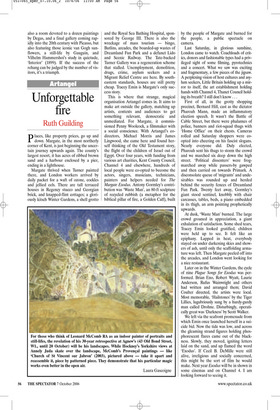Unforgettable fire
Ruth Guilding
Places, like property prices, go up and down. Margate, in the most northerly corner of Kent, is just beginning the uncertain journey upwards again. The county’s largest resort, it has acres of ribbed brown sand and a harbour enclosed by a pier, ending in a lighthouse.
Margate thrived when Turner painted there, and London workers arrived by daily packet for a waft of ozone, cockles and jellied eels. There are tall terraced houses in Regency stucco and Georgian brick, and knapped-flint cottages; a gloriously kitsch Winter Gardens, a shell grotto and the Royal Sea Bathing Hospital, sponsored by George III. There is also the wreckage of mass tourism — bingo, Butlins, arcades, the boarded-up wastes of Dreamland Fun Park and a defunct Lido and Scenic Railway. The Tate-backed Turner Gallery was a regeneration scheme that stalled. Unemployment, demolition, drugs, crime, asylum seekers and a Migrant Relief Centre are here. By southeastern standards, houses are still pretty cheap. Tracey Emin is Margate’s only success story.
This is where that strange, magical organisation Artangel comes in. It aims to make art outside the gallery, matching up artists, contexts and audiences to get something relevant, democratic and unmediated. For Margate, it commissioned Penny Woolcock, a filmmaker with a social conscience. With Artangel’s codirectors, Michael Morris and James Lingwood, she came here and found herself thinking of the Old Testament story, the flight of the children of Israel out of Egypt. Over four years, with funding from various art charities, Kent County Council, Channel 4 and elsewhere, hundreds of local people were co-opted to become the actors, singers, musicians, technicians, painters and helpers needed for The Margate Exodus. Antony Gormley’s contribution was ‘Waste Man’, an 80-ft sculpture of recycled rubbish (a metaphor for the biblical pillar of fire, a Golden Calf), built by the people of Margate and burned for the people, a public spectacle on camera.
Last Saturday, in glorious sunshine, London came to watch. Coachloads of critics, donors and fashionable types had a privileged sight of some filming, pyrotechnics and a concert. What we saw was exciting and fragmentary, a few pieces of the jigsaw. A perplexing vision of host cultures and asylum seekers, Little Britain holding up a mirror to itself, the art establishment holding hands with Channel 4, Thanet Council holding its breath? I still don’t know ...
First of all, in the grotty shopping precinct, Bernard Hill, cast as the dictator Pharoah Mann, made an inflammatory election speech. It wasn’t the Battle of Cable Street, but there were phalanxes of police, banners and riot-squad thugs with ‘Home Office’ on their chests. Cameras rolled and Saturday shoppers were coopted into cheering on his fascist slogans. Nearly everyone did. Duly elected, Pharoah sent his thugs to storm the crowd and we marched six deep down the high street. ‘Political dissenters’ were frogmarched away while passers-by gawped and then carried on towards Primark. A disconsolate queue of ‘migrants’ and undesirables was rounded up and herded behind the security fences of Dreamland Fun Park. Twenty feet away, Gormley’s giant stood sentinel, knobbly with chair carcasses, tables, beds, a piano embedded in its thigh, an arm pointing prophetically upwards.
At dusk, ‘Waste Man’ burned. The large crowd groaned in appreciation, a giant exhalation of satisfaction. Some shed tears, Tracey Emin looked gratified, children were held up to see. It felt like an epiphany. Lapped in heat, everybody stayed on under darkening skies and showers of ash, until only the scaffolding armature was left. Then Margate peeled off into the arcades, and London went looking for a nice restaurant.
Later on in the Winter Gardens, the cycle of nine Plague Songs for Exodus was performed. Brian Eno, Robert Wyatt, Laurie Anderson, Rufus Wainwright and others had written and arranged them; David Coulter directed, the artists were local. Most memorable, ‘Hailstones’ by the Tiger Lillies, lugubriously sung by a hurdy-gurdy man called Drohne. Disturbingly, operatically great was ‘Darkness’ by Scott Walker.
We left via the seafront promenade from which Emin once launched herself in a suicide bid. Now the tide was low, and across the gleaming strand figures holding phosphorescent flares came out of the blackness. Slowly, they moved, igniting letters laid on the sand, and up flamed the word ‘Exodus’. If Cecil B. DeMille were still alive, irreligious and socially concerned, this might be the sort of film he would make. Next year Exodus will be in shown in some cinemas and on Channel 4. I am looking forward to seeing it.


















































































 Previous page
Previous page